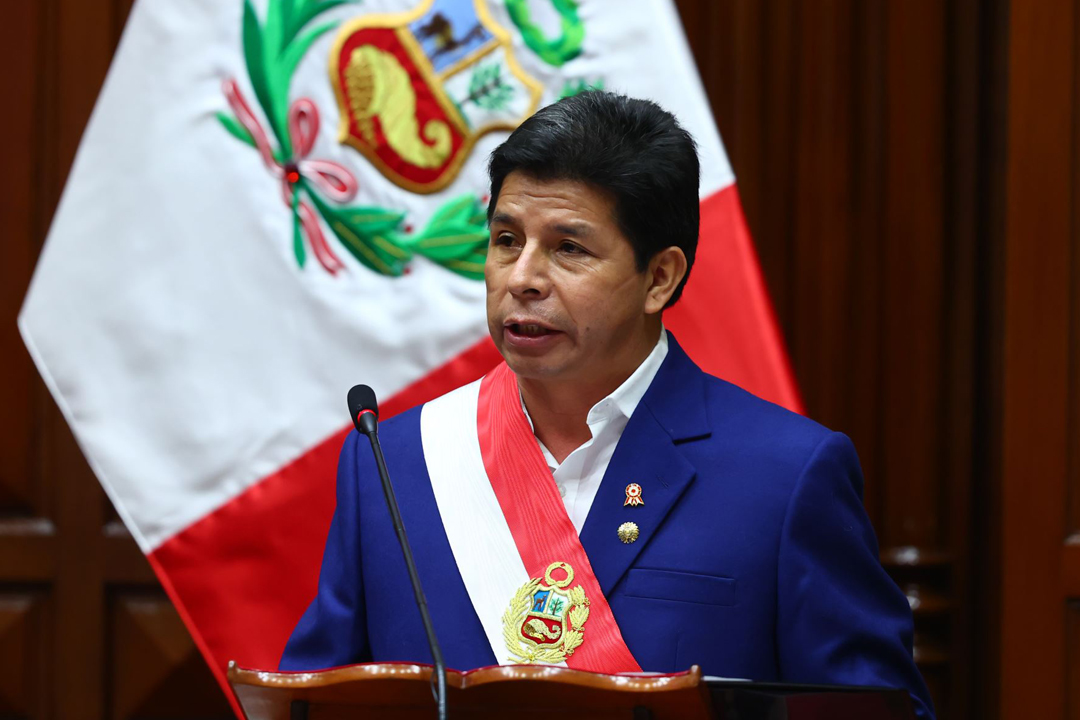Peru’s president, Pedro Castillo, is facing his third impeachment trial in the last year, adding to the sense that the South American nation is almost ungovernable after years of political turmoil. However, bonds remain buoyant while the sol outperforms its peers.
The nation’s dollar-denominated debt maturing in 2031 barely registered variation over the past month, even as Castillo became embroiled in one controversy after another.
The spread of sovereign bonds against U.S. Treasury instruments has also remained stable since the resignation of the last finance minister earlier this month, hovering around 2.2 percentage points, the lowest in the region after Chile and Uruguay.

Bonds are caught in limbo, torn between worries about political chaos and the appeal of a strong economy. Analysts say political risks are now fully discounted, following the succession of five presidents in the past six years, while Peru’s high foreign exchange reserves and solid fiscal backdrop keep bonds from falling further.
“There have been so many presidents who haven’t finished their terms in Peru, the market is a little bit numb,” said Sarah Glendon, senior analyst at Columbia Threadneedle Investments in New York. Investors have come to “expect some degree of a revolving door of political leaders in Peru.”
Currency markets have also been calm. Peru’s currency has strengthened more than 1.5% against the dollar this month, the fourth-best performance against its 23 emerging-market peers tracked by Bloomberg. The sol’s gains compare with a nearly 1.4% drop in the Colombian peso and a 1.8% decline in the Chilean peso in August.
However, that resilience may soon be tested. Earlier this month, opposition lawmakers said they are closer to the 87 votes needed to oust Castillo this time. Adding to the drama, some of the president’s family members face a corruption investigation, and his sister-in-law turned herself in on charges of alleged influence peddling.
On Tuesday, Peruvian prosecutors requested a three-year national arrest warrant for the first lady and her siblings.
Prime Minister Anibal Torres on Monday accused the judicial system of “political persecution” against Castillo. He said prosecutors “do not seek to discover the truth but to create a crime.”
“Given the revolving door of governments, the market no longer reacts as deeply to transitions, even if they are messy,” said Ayman Ahmed, a money manager at Thornburg Investment Management Inc. There would have to be a “fundamental change in the fabric of the Peruvian economy” for bonds to fall.
Morgan Stanley strategists last week removed a “dovish” stance on Peru’s sovereign external bonds and turned neutral on the debt, saying the instruments are already discounting political uncertainty and that fundamentals remain sound.
Part of the credit should be given to Julio Velarde, a U.S.-trained economist at the helm of the country’s central bank for nearly 16 years.
Peru recorded the fastest growth and lowest inflation among major Latin American nations under Velarde’s tenure: the economy has expanded at an average of 4.5% year-on-year since the fourth quarter of 2006, with average inflation just above 3% during the same period.
“Political instability is high but does not drive price action and should remain so as long as Velarde remains at the helm of the BCRP,” Citigroup analysts, including Dirk Willer and Andrea Kiguel, wrote in a note to clients Thursday, maintaining a neutral view on the country’s currency and local bonds.
Such calm among investors is unusual in South America at the moment.
Last month, Argentina’s black market exchange rate plunged more than 30% following the abrupt resignation of Economy Minister Martin Guzman. Chilean markets have also fluctuated sharply ahead of the September 4 referendum on a new constitution.
In Ecuador, social unrest in June that threatened President Guillermo Lasso’s term in office sent its dollar bonds to record lows.
But while Peru’s political turmoil may not worry bondholders, it impacts the country’s long-term economic potential. And that slowly but surely makes the debt less attractive, said Valerie Ho, portfolio manager at DoubleLine Group in Los Angeles.
For Peru, “political uncertainty is hampering investment and reducing potential growth,” Ho said. “Peru has been a place to hide” during global volatility, but the implications of political events are negative.
With information from Bloomberg

